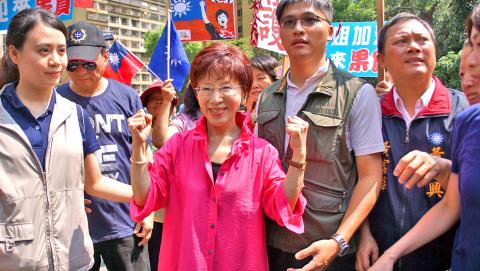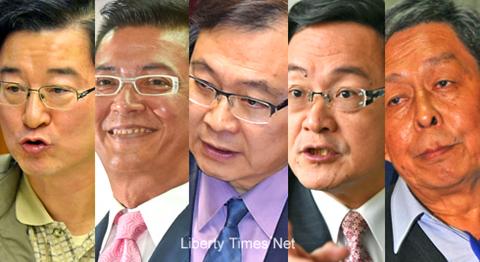The Chinese Nationalist Party (KMT) will not tolerate members “waving a blue flag to oppose the blue flag,” (打著藍旗反藍旗) KMT Chairman Eric Chu (朱立倫) said yesterday after five vocal critics of the party were unexpectedly kicked out.
“There are a few members who have repeatedly criticized the party in public, against the consensus of senior party members that the party has to stay united to win the elections [in January],” Chu told the party’s Central Standing Committee at its weekly meeting.
Chu was adapting the phrase “waving a red flag to oppose the red flag,” which refers to those who pretended to adhere to Mao Zedong’s (毛澤東) teachings, but actually tried to oust him during China’s Cultural Revolution.

Photo: CNA
“It is unacceptable for party members to wave a blue flag to oppose the blue flag,” Chu said.
Chu’s statement came after Legislator Chi Kuo-tung (紀國棟), Taipei City Councilor Lee Ching-yuan (李慶元), former Taipei City councilor Yang Shih-chiu (楊實秋), former legislator Chang Sho-wen (張碩文) and alternative Central Committee member Lee Po-jung (李柏融) were expelled from the party.
The KMT’s Central Evaluation and Disciplinary Committee called a meeting yesterday morning to revoke the memberships of the five party members. The Central Standing Committee approved the resolution in the afternoon.

Photo: Liberty Times
Chu said the party “had no choice but to” exert the disciplinary measures because the five had launched “malicious attacks” on the party, “even trying to divide the KMT.”
From past experience, it is evident that “a divided KMT can never win,” Chu said, adding that senior party members whom he recently visited — including former KMT chairmen Lien Chan (連戰) and Wu Poh-hsiung (吳伯雄), and Legislative Speaker Wang Jin-pyng (王金平) — told him that the KMT has to stay united to win the elections.
The expulsion of the five came four days ahead of the party’s national congress on Sunday at which the KMT is to officially decide whether Deputy Legislative Speaker Hung Hsiu-chu (洪秀柱) will be its presidential candidate.
At last week’s Central Standing Committee meeting, Chu had countered those who have quit or plan to quit the KMT, with some citing Hung’s stance on cross-strait relations, saying their moves have more to do with their own nominations than whether Hung would secure the presidential nomination.
“The central mission of the national congress should be to bring together the party to win the presidential and legislative elections,” Chu said yesterday.
Lee Po-jung — who had said he would propose at Sunday’s congress that Hung’s nomination be voted on, as opposed to the previous practice in which a candidate only needed to gain applause to be handed the nomination — yesterday said that he was “disappointed” that the KMT had expelled those “who tell the truth” about the party.
“I will be attending the national congress to exercise my rights and obligations as a member. The KMT was not democratic enough, as it used its own discretion to revoke my membership without giving me a chance to explain myself,” Lee Po-jung said.
The KMT said in a statement that Lee Po-jung had committed “a grave violation of party discipline” by attempting to sue Chu, KMT Secretary-General Lee Shu-chuan (李四川) and Hung for forgery and fraud, questioning the authenticity of the signatures that Hung collected to back her candidacy during the first stage of the party’s presidential primary.
Chi, Lee Ching-yuan, Yang and Chang were expelled because they criticized the KMT on TV talk shows, the statement said.
The expulsion of Chi immediately ousted him from the legislature because he represents the KMT as a legislator-at-large.
Chi’s role is to be filled by National Chengchi University adjunct associate professor Mignonne Chan (詹滿容).
Unfazed by the decision, Chi said that he felt “at ease,” but was worried about the “pathetic” state the “party leader” has gotten the KMT into.
“Even though I made some mistakes, it was the party’s leader who made the serious ones. An ordinary party member cannot do much harm to the party, but the leader can destroy it when he gets things wrong,” Chi said, urging the party’s upper echelons to undergo thorough self-reflection.
In April, Chi paid a fine of NT$4 million (US$127,910) to the KMT for his absence from legislative plenary sessions and his failure to raise sufficient donations as a legislator-at-large.
Chi was hoping to secure a chance to compete against Legislator Yen Kuan-hen (顏寬恆) for the nomination as a legislative candidate for the second constituency of Taichung, which is Chi’s hometown.
The KMT nominated Yen in the constituency and suggested that Chi run in the seventh constituency instead, but Chi rejected that option.
“If I accepted being drafted to run in the seventh constituency, would the KMT treat me like a treasure? Now I am a weed that the party wants to eradicate,” he said.

Intelligence agents have recorded 510,000 instances of “controversial information” being spread online by the Chinese Communist Party (CCP) so far this year, the National Security Bureau (NSB) said in a report yesterday, as it warned of artificial intelligence (AI) being employed to generate destabilizing misinformation. The bureau submitted a written report to the Legislative Yuan in preparation for National Security Bureau Director-General Tsai Ming-yen’s (蔡明彥) appearance before the Foreign Affairs and National Defense Committee today. The CCP has been using cognitive warfare to divide Taiwanese society by commenting on controversial issues such as Taiwan Semiconductor Manufacturing Co’s (TSMC, 台積電) investments in the

INVESTIGATION: The case is the latest instance of a DPP figure being implicated in an espionage network accused of allegedly leaking information to Chinese intelligence Democratic Progressive Party (DPP) member Ho Jen-chieh (何仁傑) was detained and held incommunicado yesterday on suspicion of spying for China during his tenure as assistant to then-minister of foreign affairs Joseph Wu (吳釗燮). The Taipei District Prosecutors’ Office said Ho was implicated during its investigation into alleged spying activities by former Presidential Office consultant Wu Shang-yu (吳尚雨). Prosecutors said there is reason to believe Ho breached the National Security Act (國家安全法) by leaking classified Ministry of Foreign Affairs information to Chinese intelligence. Following interrogation, prosecutors petitioned the Taipei District Court to detain Ho, citing concerns over potential collusion or tampering of evidence. The

‘COMPREHENSIVE PLAN’: Lin Chia-lung said that the government was ready to talk about a variety of issues, including investment in and purchases from the US The National Stabilization Fund (NSF) yesterday announced that it would step in to staunch stock market losses for the ninth time in the nation’s history. An NSF board meeting, originally scheduled for Monday next week, was moved to yesterday after stocks plummeted in the wake of US President Donald Trump’s announcement of 32 percent tariffs on Taiwan on Wednesday last week. Board members voted to support the stock market with the NT$500 billion (US$15.15 billion) fund, with injections of funds to begin as soon as today. The NSF in 2000 injected NT$120 billion to stabilize stocks, the most ever. The lowest amount it

NEGOTIATIONS: Taiwan has good relations with Washington and the outlook for the negotiations looks promising, Minister of Economic Affairs J.W. Kuo said Taiwan’s GDP growth this year is expected to decrease by 0.43 to 1.61 percentage points due to the effects of US tariffs, National Development Council (NDC) Minister Paul Liu (劉鏡清) said at a meeting of the legislature’s Economics Committee in Taipei yesterday, citing a preliminary estimate by a private research institution. Taiwan’s economy would be significantly affected by the 32 percent “reciprocal” tariffs slapped by the US, which took effect yesterday, Liu said, adding that GDP growth could fall below 3 percent and potentially even dip below 2 percent to 1.53 percent this year. The council has commissioned another institution